Thursday Feb 19, 2026
Thursday Feb 19, 2026
Friday, 4 December 2020 00:38 - - {{hitsCtrl.values.hits}}
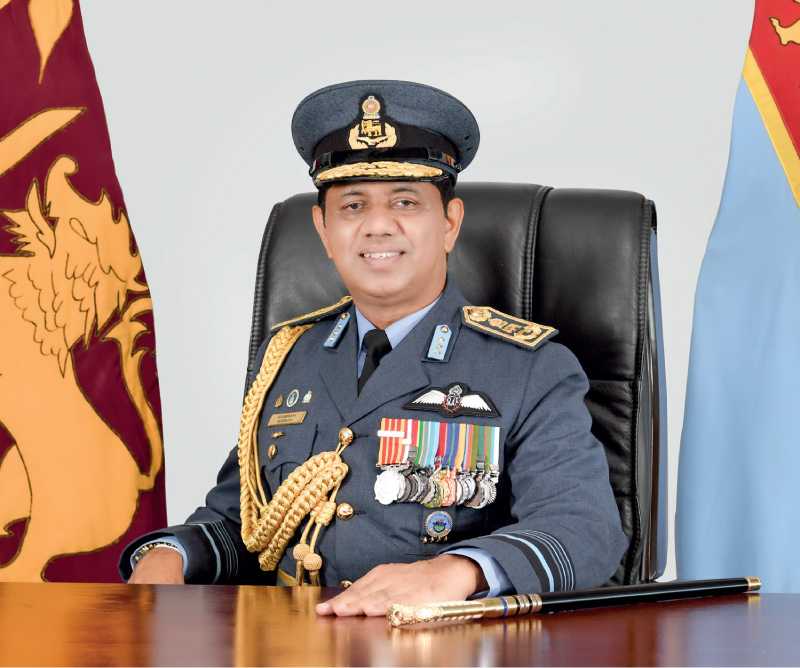
Air Force Commander Air Marshal Sudarshana Pathirana - (See video on FT TV. ft.lk)
It has been a decade since the conflict in Sri Lanka came to an end. As Sri Lankans look to the future, national security and stability plays an important role in ensuring the country prospers. Key to this is cultivating more technologically-advanced, inclusive and professional armed forces, something that was recently highlighted with the commissioning of two female pilots to the Sri Lanka Air Force. “The SLAF is a technical force. In the Air Force there is no gender, race or religious discrimination. We have a very fair and transparent way of doing things. We are happy that two lady pilots earned their wings,” stated Commander of the Air Force Air Marshal Sudarshana Pathirana in an exclusive interview with Daily FT. “The Air Force is one small family and we don't discriminate.”
Air Marshal Pathirana was recently appointed as the 18th Commander of the Sri Lanka Air Force, having joined its ranks in 1987. While his achievements would be too many to list, it’s notable that over the course of his career, he has distinguished himself with his exemplary combat record and has been awarded with gallantry medals on eight occasions.
In a wide-spanning interview he spoke about the SLAF’s strategy for 2030 and the importance of maintaining ‘air power’ of the Air Force while expanding maritime surveillance, regional cooperation, cyber security, and the use of unmanned drones. Following are excerpts:
By Asiri Fernando
 Q: To start with, the current economic position of Sri Lanka is challenging and we have ambitions of becoming a regional hub. What strategies does the SLAF have in place to meet the challenges of the future?
Q: To start with, the current economic position of Sri Lanka is challenging and we have ambitions of becoming a regional hub. What strategies does the SLAF have in place to meet the challenges of the future?
As soon as I took over duties, I put forward four guidelines for the Air Force to follow to achieve the national security objectives given by the President. In his 10 guidelines, the priority is national security, and being the Air Force, we too have a huge responsibility in achieving and maintaining national security objectives.
As per your question about the economic situation, my guidelines are to first maintain our current capabilities and use the air assets to achieve national security objectives. Secondly, I plan to enhance the capabilities of the SLAF in the maritime domain. Third is to see the possibility of acquiring new technology to enhance our capability in cyber security and Unmanned Aerial Vehicles (UAVs), and the fourth area we are going to look into will be HADR (Humanitarian Assistance and Disaster Relief) operations – since we are an island we face a lot of natural calamities and as the Air Force we are responsible for safeguarding the lives and property of Sri Lankans.
Q: As an island nation which has become a focal point of interest for regional and extra regional powers, what type of Air Force does the SLAF plan to evolve into by 2030? What are the ambitions of the SLAF?
We have our vision plan for 2025 and we have expanded it to 2030. The main focus is to expand our capabilities in the maritime domain, and to maintain and secure the maritime resources for our future generations.
As we all know, Sri Lanka is an island, we have a sea area almost 16 times bigger than our land area. We believe the resources are lying there for the future. As per the Air Force, the force which is responsible for protection from the third dimension, we are planning to expand our wings to provide maritime security.
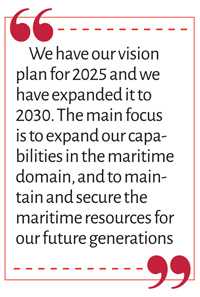 |
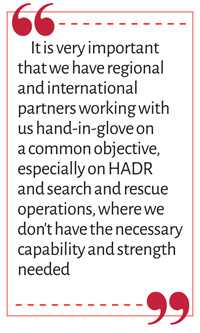 |
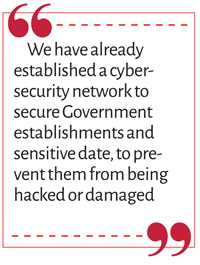 |
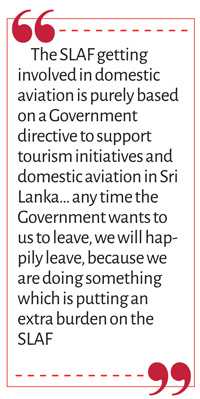 |
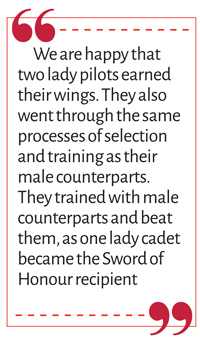 |
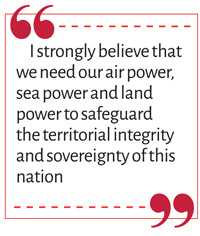 |
Q: The maritime domain and the sea approaches to Sri Lanka are vital in its desire to become a ‘hub’ for maritime trade and aviation. Looking towards 2030, what technologies does the Air Force plan to master? What capabilities do you want to field by 2030, other than maritime domain awareness?
As I said initially, in line with my four guidelines, we plan to acquire technology and expand. Mainly on cyber security and UAV platforms. Those are the areas I believe will be important for future warfare.
Q: Sri Lanka spends a colossal amount of Government revenue on defence. Critics have questioned if there is a need for such expenditure during peacetime. For example in 2019, Rs. 306 billion was spent on defence. You spoke of maintaining air power and the need to maintain the fleet. Why is it important for the Air Force to maintain the capabilities it currently has, such as jet aircrafts and attack aircrafts?
We have to learn from our past experience and we have lot of bitter experience as Sri Lankans. We came through and achieved peace through a lot of hard work and sacrifices. So it is very important during peace time that we as Sri Lankans maintain our defence forces’ strength and strategy to face any internal or external aggression or threats. Otherwise, we will be going back to the same cycle of pain to come back to normal. So I strongly believe that we need our air power, sea power and land power to safeguard the territorial integrity and sovereignty of this nation.
As an example, in 1983 once the conflict started, we were not ready. The Air Force had to wait till 1991 to actively provide air power in support of our ground forces. That’s about a seven- to eight-year wait. So, during that seven to eight years, our enemy managed to strengthen itself to challenge our forces. This was indeed a good experience, a learning curve for us to see why we need to maintain our defence posture and air power capabilities to face future challenges.
Q: You spoke about the need to expand maritime surveillance. The SLAF last year stood up No. 3 Squadron after a lapse of several years, what do you have planned for the No. 3 Squadron? The Navy has also long indicated the need for maritime air surveillance capability; how is the SLAF planning to work with the Navy on this matter?
The Indian Ocean is not only important to Sri Lanka but to the entire world. Because a majority of the shipping activities, close to 70% of shipping activities, are moving just south of Sri Lanka. It is therefore very important as a country that we maintain a safe and secure environment in this region to maintain the economy activities of the world.
All the major world and regional players are also concerned about our strength and capabilities for securing the region’s maritime activities, so it’s very important for the SLAF and the Navy to get together and secure this region, and to keep our waters safe for trade from all over the world. I must say that the Sri Lanka Navy and the Air Force have started collaborating and have started joint training to maintain maritime security around our country.
To answer your question, the re-establishing of the No. 3 Maritime Squadron was a timely need and we established it in line with our vision for 2025. Initially we started with one Beechcraft aircraft and a Y-12 flying on surveillance and reconnaissance missions over our maritime area. We have plans to enhance our Maritime Patrol fleet to meet future challenges.
Q: There were reports that Sri Lanka is in discussions with India to obtain a maritime patrol aircraft from them. There was also a grant of $ 39 million approved by the US Congress to support the maritime security initiatives of Sri Lanka. What is the progress of these discussions?
We are talking to all our friends in getting help to enhance our maritime security capability. We are making progress with all the channels that are offering to help us. In the near future we will expand our maritime reconnaissance capability.
Q: In terms of acquisition of aircraft, other countries have leased aircrafts as stop-gap measures, which is a cost-effective option. Has the SLAF explored such options?
Leasing aircraft for military operations, especially for maritime domain operations, is not an easy task. The majority of aircraft available for lease will not have the capability for the roles and tasks necessary. We are using satellite imagery, however most satellite systems are governed by different countries and as such they have their own defence priorities, so we need to careful when using such systems for our national security objectives
Q: The SLAF recently commissioned two female pilot officers into its ranks, and made history in Sri Lankan military aviation. How does the SLAF plan to become a more inclusive force in the future?
The SLAF is a technical force. In the Air Force there is no gender, race or religious discrimination. We have a very fair and transparent way of doing things. We are happy that two lady pilots earned their wings. They also went through the same processes of selection and training as their male counterparts. They trained with male counterparts and beat them, as one lady cadet became the Sword of Honour recipient. The Air Force is one small family and we don't discriminate.
Q: Does the Sri Lanka Air Force plan to right-size the force to maintain skill retention and achieve efficiency with the force at hand?
Right now we are a 34,000 strong force. As the 18th Commander of the Air Force I have said that professionalism is the key to sustaining the SLAF. We want to get the maximum out of our professionals for the country. We are trying to right-size the force, but not by reducing the numbers. By doing this we can reduce the intake with time, something that will also happen with the acquisition of new technology. By improving professionalism we can right-size the force.
Q: There has been criticism about continued Air Force presence in domestic aviation by the civil aviation industry. Some critics have said that the Air Force presence in the sector is a hindrance to the growth of the industry. How do you respond to these concerns?
The SLAF getting involved in domestic aviation is purely based on a Government directive to support tourism initiatives and domestic aviation in Sri Lanka. Since no private entrepreneurs entered into it at the time, the SLAF had to fill in the gap. Any time the Government wants to us to leave, we will happily leave, because we are doing something which is putting an extra burden on the SLAF. I don’t know why the critics are arguing about the SLAF being in domestic aviation business, because every cent we earn goes back to the Treasury. We are not doing a business, we are only supporting the Government to achieve its objectives.
Q: The SLAF has an indigenous Unmanned Aerial Vehicle (UAV) project, UAVs are commonly referred to as ‘drones’. What is the current status of the project?
We have had an indigenous UAV project running for a couple of years, and we are at the tail-end of achieving an UAV for Sri Lanka through the SLAF. So probably we should have the first models flying by end 2021, supporting the SLAF activities. We want to use these machines to support our operations. We are planning to use them to fulfil the requirements of Local Government agencies, such as wildlife conservation, forestry monitoring, law enforcement and disaster management. There is a demand from these agencies for UAV support for their missions, and we plan to assist them with these UAVS.
Q: Staying on the topic of drones, due to the commercial proliferation of drones and the easy access to the technologies related to them, drones are becoming a threat to many countries. Has the SLAF planned to meet this threat?
The controlling of drones falls under the purview of the Director of Civil Aviation. We are the protectors of the skies and we will maintain the orders issued by the Civil Aviation Authority regarding drones. As you correctly said, drones are becoming a threat worldwide. We have acquired the required technology to ‘jam’ drones (disrupt their control) and bring them down. However, what we have is not enough, and we need to expand the technology and weaponry to control drone activities.
Q: Sri Lanka is becoming more dependent on its digital infrastructure. Most of the island’s critical infrastructure is also dependent on digital networks for their operations. How is the SLAF preparing to ensure the security of the digital domain?
As per the responsibilities entrusted to the SLAF, we are protectors of the third dimension. Data and information moves through the third dimension most of the time. The Air Force is duty bound to protect these systems and the date. Keeping that in mind, we have already established a cyber-security network to secure Government establishments and sensitive data, to prevent them from being hacked or damaged. As we discussed in the beginning, we are planning to expand the technology, as we all know cyber security and related technologies develop very fast, and it is changing every day. We can't be happy at one moment and say we have archived our target, we have to continuously modernise to face the threats.
Q: Since the end of the war, the SLAF has been contributing to further Sri Lanka's foreign interests by contributing troops and aircraft for UN Peacekeeping Missions. Can you explain the SLAF's role in UN Peacekeeping?
The recognition by the UN of the SLAF in UN missions itself shows the professionalism of the SLAF. At present, we have two missions ongoing – one in South Sudan and one in the Central African Republic, supporting the UN mission in those areas through our aviation platforms. We have six Mi-17 helicopters and more than 200 personnel deployed on those missions. The missions also bring around $ 25 million to the Government per annum.
By deploying our personnel on UN missions, we continue to maintain our capabilities, retain skills and meet the challenge of operating in other parts of the world. By contributing to UN missions, we will help Sri Lankan interests in international forums and improve our air diplomacy.
Q: The SLAF, like the Army and Navy, is working closely with regional and extra regional partners. In the recent past, we have seen a significant increase in joint exercises and coordination in HADR, security and defence. How important is it for Sri Lanka to have regional cooperation and interoperability with partnering nations?
It is very important that we have regional and international partners working with us hand-in-glove on a common objective. Especially on HADR and Search and Rescue operations, where we don't have the necessary capability and strength needed. It is very important that we do joint training exercises and build an understanding between our friends, so that in case there is a need to work together it is easy and streamlined and all parties can achieve the set objectives.